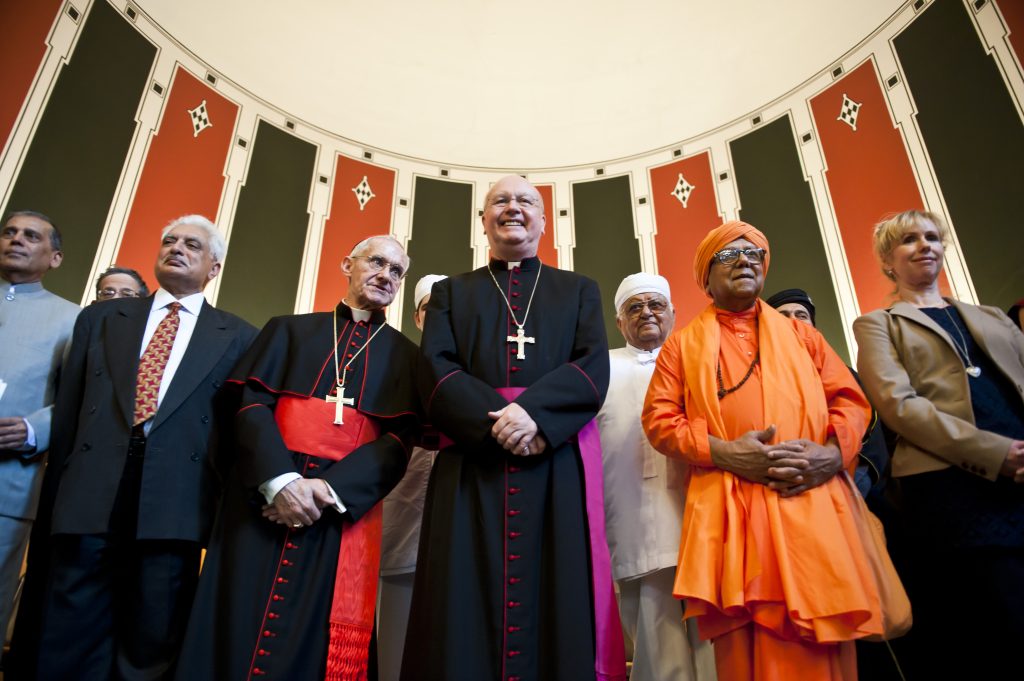Check out these amazing interfaith and intercultural dialogue initiatives, and find resources to support you to bridge divides with dialogue.
by Taylor O’Connor and Mustapha Ali | 1 October 2024
Prayer for Peace Interfaith Event 2013 | Photo on flickr
“Interfaith dialogue is not a luxury, it is a necessity, and only through it can we establish lasting peace.” – Pope Francis
During the years I lived in Myanmar I worked with a bunch of interfaith and intercultural peacebuilding initiatives. As violence spread around the country targeting religious minorities many of these groups started organizing interfaith dialogues, or the deepened their existing dialogue activities.
I was never directly involved in these, but the approach was fascinating to me. The interfaith leaders in particular were inspiring individuals. So in researching and mapping interfaith peacebuilding initiatives, I was very excited to hone in on interfaith/intercultural dialogue initiatives for this blog post.
I wanted to see what organizations are out there, what resources they produce and what opportunities they have to my interfaith peacebuilder friends in Myanmar. And now, as our community at Everyday Peacebuilding continues to grow, I’m pleased to offer this mapping of interfaith and intercultural dialogue initiatives for all to see. In here you can find great organizations to get connected with, to find resources, to see inspiring examples, and to find learning opportunities.
Lessons learned in researching interfaith and intercultural dialogue initiatives
Reviewing all these interfaith and intercultural dialogue initiatives I learned a lot about the approaches they take and other lessons.
A mapping of approaches to interfaith and intercultural dialogue:
- Most intercultural and interfaith dialogue initiative are engaged explicitly on organizing and facilitating dialogue sessions
- Some initiatives focus on creating platforms and/or safe spaces for dialogue
- Some engage in dialogue amongst groups in conflict
- Some engage in dialogue to promote acceptance of immigrant and migrant communities
- Some engage in dialogue across divides or explicitly address polarization
- Some conduct trainings and/or support participants to develop capacitives for dialogue and participation
Other lessons learned about interfaith and intercultural dialogue:
- Dialogue initiatives sometimes overlap with initiatives focused on mediation, negotiation, forgiveness and/or reconciliation, but generally they are focused solely on dialogue as an end in itself
- Many interfaith organizations include interfaith dialogue activities, but there are few organizations explicitly focused on interfaith dialogue
- Many local and national peacebuilding organizations included interfaith dialogue activities, but are not explicitly dedicated to interfaith dialogue. As smaller organizations, most have little information about their dialogue activities.
- Some mediation groups describe their activities as dialogue, but their activities are focused on mediation. For them, dialogue is one mediation tool.
- Some interfaith dialogue activities are linked to taking action or collaborative projects, but most focus on dialogue as an end in itself, an ongoing process.
- Many local interfaith and intercultural dialogue initiatives operate in conflict-affected contexts, but many others work in non-active conflicts and are focused on addressing general tensions or are in response to specific events of violence.
- Some initiatives are explicit about promoting interfaith cooperation between two or three religious groups while others take a more broad approach for the use of dialogue to promote understanding amongst all faiths and cultures in general or in a given community or nation.
- Generally, initiatives approach interfaith dialogue as long-term process, not a one-off activity.
Interfaith and intercultural dialogue initiatives
Below are organizations and networks for interfaith and intercultural dialogue. I have included only organizations that are explicitly dedicated to either interfaith dialogue, intercultural dialogue or both.
There are many topics and approaches associated with interfaith and intercultural dialogue that I will cover in separate blog posts. I will link those here once they are complete. Other associated topics to be covered in other blog posts include the following:
- interfaith and interfaith peacebuilding organizations and networks with many different projects and approaches, or organizations that focus on the promotion of freedom of religion and belief
- faith-based peacebuilding organizations
- dialogue initiatives focused on topics different from interfaith and intercultural dialogue
- general peacebuilding initiatives that promote social cohesion, coexistence and associated topics that may sometimes have activities in dialogue
- organizations focused on teaching active listening, nonviolent communication or other communication tools
- dialogue for civic engagement, consensus building and advocacy to policymakers
- Organizations focused on mediation and negotiation
- Organizations focused on forgiveness, reconciliation, and/or restorative justice
United Nations Alliance of Civilizations
The United Nations Alliance of Civilizations (UNAOC) is an initiative that promotes intercultural dialogue, understanding, and cooperation among nations and communities to combat polarization and extremism. They work to bridge divides and strengthen partnerships among diverse cultures, religions, and civilizations. They have a number of programs and activities that promote intercultural dialogue and inclusion, including a youth peacebuilder training program, conferences and events, as well as multimedia, tech and educational activities.
International Dialogue Centre – KAICIID
The International Dialogue Centre – KAICIID works to promote dialogue between different cultures and religions, with the goal of fostering peace, understanding, and cooperation. They build bridges between religious communities and policymakers, aiming to prevent conflicts and promote peaceful coexistence. They do this by organizing intercultural and interreligious dialogues, offering training programs, and collaborating with international organizations to address global challenges like migration, violence, and social cohesion.
Ikeda Center for Peace, Learning and Dialogue
Ikeda Center promotes peace and global citizenship through education and dialogue. They work to foster understanding and collaboration among people of different cultures and perspectives, inspired by the values of humanism and nonviolence. They organize public events, produce educational resources, and facilitate discussions on topics such as peacebuilding, democracy, and human dignity, all grounded in the ideas of their founder Daisaku Ikeda.
Network for Dialogue
The Network for Dialogue is a platform that works to foster interreligious and intercultural dialogue for the social inclusion of migrants and refugees in Europe. They build connections between faith and civil society leaders to advocate for policymaking for social inclusion policies for migrants and refugees. The network brings together a diverse tapestry of members from across Europe, empowering members to combat hate speech and prejudice. They host regular meetings and webinars, and support grassroots initiatives to support policymaking and build bridges of solidarity for those seeking refuge in new host societies.
The Living Room Conversations
Livingroom Conversations (LRC) connects people across communities and differences through dialogue, nurturing trust and understanding. They believe that belonging begins with conversation and centers around facilitating conversations that ensure everyone feels seen and heard while celebrating our unique differences. They offer advanced training and workshops to dive deeper into the ‘Living Room Conversation model’, tailored to the specific needs of workplaces, congregations, schools, and more. Their website includes great resources to help anyone get started in facilitating conversations. Their resources are great for any level of experience in dialogue facilitation.
The Hands Across the Hills
Hands Across the Hills is a grassroots initiative uniting individual from rural Western Massachusetts and Eastern Kentucky to foster understanding and dialogue across diverse communities. They coordinate immersive cultural exchanges and structured dialogues to cultivate trust, care, and unity, paving the way for a future where the voices of all diverse community members are heard and valued.
The New Mexico Interfaith Dialogue
New Mexico Interfaith Dialogue works to foster understanding between faith traditions in New Mexico. They believe that through ongoing dialogue across different faith traditions they can build mutual understanding, address social issues, and cultivate a spirit of inclusivity. They host regular and ongoing interfaith dialogue events, organize larger periodic community events, and provide educational resources that encourage peaceful co-existence and shared action among religious communities.
Nansen Dialogue Centers
Nansen Dialogue Centers are a network of dialogue centers established in the Balkans during the 1990s, aimed at fostering dialogue and reconciliation among ethnic groups in post-conflict regions. Founded by the Norwegian Nansen Academy, they are neutral spaces for people of different ethnic backgrounds to engage in open discussions, promoting mutual understanding and reducing tensions. They offer mediation, training, and educational programs with the ultimate aim of building trust and peaceful coexistence, particularly in areas affected by ethnic conflict in the former Yugoslavia. Today they also conduct activities in Norway and have begun to expand their dialogue support activities to other countries.
Sustained Dialogue Institute
The Sustained Dialogue Institute works to foster communication and understanding among diverse groups to address conflict and promote social change. They use dialogue as a transformative process that engages communities and organizations in addressing divisive issues and fostering mutual respect. They train facilitators, carry out dialogue programs, and provide resources that help participants explore underlying tensions and build relationships across differences. Their efforts promote dialogue on college campuses, in workplaces, with diverse community members, and amongt community leaders around the world.
Get involved and promote interfaith and intercultural understanding
As we conclude this mapping of interfaith and intercultural dialogue organizations, I hope it sparks your interest as it did mine, and that you get inspired to find ways to get involved and promote interfaith and intercultural dialogue.
These initiatives offer incredible resources, learning opportunities, and inspiring examples of bridging divides through dialogue. Whether you’re seeking ways to support interfaith peacebuilding, find tools to aid your own community, or simply learn from those leading the way, now is the time to connect, engage, and contribute to these crucial efforts for peace. Let’s turn knowledge into action and work together toward a more peaceful and inclusive world.
If you found this article helpful and want to find more blog posts like this mapping organizations that build peace across a wide array of themes be sure to check out our Resources page!
If there are any great organizations that are missing on this list and you think it should be added, please submit it at the link HERE. I periodically update my resource posts and use these inputs to help me. Thanks in advance!
And be sure to sign up for our newsletter (the best peacebuilding newsletter out there!) to get connected with all the best articles, videos, podcast episodes, events, downloads, learning opportunities, and other resources on building peace published each week, selected from a broad array of global efforts to build peace. Subscribe by clicking HERE.




